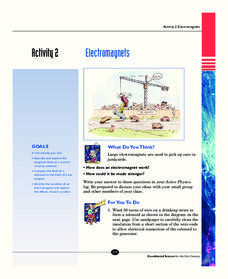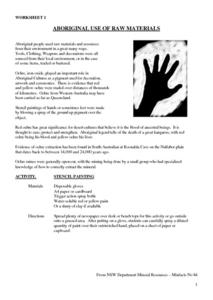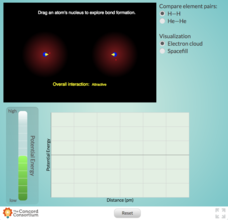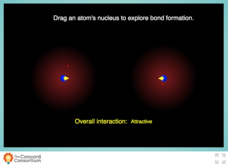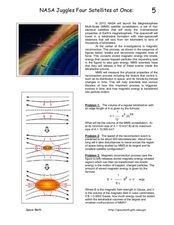Curated OER
Advanced Electromagnetism and Electromagnetic Induction
For this electromagnetism and electromagnetic induction worksheet, students answer 11 questions using calculus to determine things such as magnetic flux and wave output.
Curated OER
The Physics of Toys
Students explore physics by experimenting with classic toys. In this physical science lesson, students utilize gliders, energy balls, bouncing balls, marbles and other toys to explore how they work. Students explore each toy at a work...
It's About Time
Are Atoms Invisible?
Wow, an experiment that allows the class to participate in a missile war! Pupils discuss Thomsons's theory of cathode rays and simulate Rutherford's historical experiment to learn about atomic structure. They conclude this fourth...
It's About Time
Electromagnets
Young scientists build their own electromagnet and test it by picking up paperclips. Analysis questions evaluate knowledge at the end of the activity.
Broward County Public Schools
Force and Motion
Get the ball rolling with this upper-elementary science unit on forces and motion. Offering over three weeks of physical science lessons, this resource is a great way to engage the class in learning about simple machines, friction,...
WindWise Education
How Does a Generator Work?
I get a charge out of this. In order to learn how a generator works, groups build and test one in this ninth instructional activity of the series. The generators are tested at low speed and high speed to determine the watt output and...
Physics Classroom
Polarization
Are your young physicists static-savvy? Test their skills using an engaging interactive from the Static Electricity series! Learners evaluate scenarios to determine how charges move between conductors and insulators, then identify...
Bonneville
Solar Pathfinder Tutorial
Find the right path to learn about solar energy. Scholars set up and use Solar Pathfinders to take measurements related to solar insolation at a particular site. Based on the data, they estimate the solar potential in kWh/m^2/day of a...
NSW Department Mineral Resources
Aboriginal Use of Raw Materials
What's the difference between base metals and precious metals? Experimenting with natural metals is an interesting way for kids to learn about the world around them. Use a resource that contains over 30 pages of worksheets and...
Teach Engineering
Fun With Nanotechnology
Introduce your class to nanotechnology applications with three demonstrations that showcase scientific principles related to ferrofluids, quantum dots, and gold nanoparticles. Groups will work more closely with these applications in the...
McGraw Hill
Neutron Stars Interactive
The universe is full of sources of energy. Explore the energy of pulsars with your classes through a simulation. An interactive lesson allows learners to manipulate the angle of rotation of both the earth and the pulsars. A real-time...
Concord Consortium
Non-Bonding
What makes helium so Noble, anyway? Explore the bonding properties of helium versus those of hydrogen using an interactive resource. Science scholars manipulate atoms of each element and observe changes in potential energy as the atoms...
Concord Consortium
Energy of Bond Formation
Show your chemistry class that there's much more to covalent bonding than sharing electrons! Pupils manipulate atoms of hydrogen, oxygen, and carbon to observe the energy of bond formation using a well-rounded interactive. The resource...
Concord Consortium
Forming a Molecule
What does it look like when two atoms bond? Mol-e-COOL! Aspiring chemists observe the interaction between two atoms forming a bond in an easy-to-use interactive. Individuals move atoms closer together and observe changes in attraction...
Royal Society of Chemistry
Electronegativity Values
Finally, an electronegativity resource your class will be strangely drawn to! Skilled scientists manipulate interactive puzzles to gain an understanding of common electronegativity values. The great thing? You can conduct the lesson...
K20 LEARN
This Is How the World Ends: Coronal Mass Ejections/Space Storms
Is this the end of the world as we know it? Pupils prepare for a coronal mass ejection during a lesson from the K20 Center. The activity combines video and Internet research in a collaborative assignment that focuses on public safety...
College Board
2015 AP® Physics 2: Algebra-Based Free-Response Questions
As one of the few AP tests that count for second year college course credit, the AP Physics 2 exam requires a higher level of knowledge than most. Help young scientists study for their upcoming AP Physics 2 exams with previous...
College Board
2018 AP® Physics 2: Algebra-Based Free-Response Questions
While the AP Physics 2 test maintains the reputation for one of the most difficult AP exams, scholars feel better prepared after practicing free-response questions on currents, conservation of energy, and displacement. The College Board...
Chesterfield Township Elementary School
Gifted and Talented Enrichment Curriculum
Looking to start or support a Gifted and Talented program? An 80-page packet outlines grade-leveled lessons in all subject areas as school district's Gifted and Talented enrichment curriculum.
Utah Education Network (UEN)
Utah Open Textbook: 7th Grade Science
Physical and biological factors affect everyday living. Scholars explore electromagnetic forces, motion, the rock cycle, and geological changes. They examine cells as the building blocks of life and how organisms reproduce using images...
Curated OER
Ultra-simple Electric Generator
Students read this article to discover the secret to making a generator. They understand that there has been lots of projects for making a simple electric motor, but not for a generator.
Curated OER
NASA Juggles Four Satellites at Once
In this NASA satellites activity, students read about the Magnetosphere Multi-Scale satellite constellation that NASA will launch in 2013. They solve 4 problems including finding the volume of the MMS constellation, finding how long it...
Curated OER
Maglev Trains
Students explore how Maglev trains work. In this technology lesson, students discuss the pros and cons of Maglev compared to conventional trains. They build a simple Maglev train model.
Other popular searches
- Magnets Word Search
- Properties of Magnets
- Activities on Magnets
- Magnets and Magnetism
- Science Magnets
- Science Magnets
- Experiments With Magnets
- Science Magnets and Springs
- Magnets and Motors
- Magnets and Electricity
- Magnets and Magnetic Fields
- Magnets and Electromagnets






